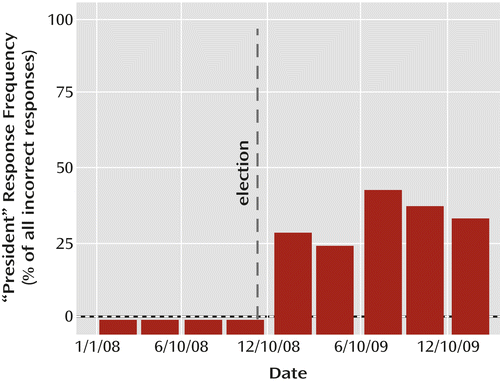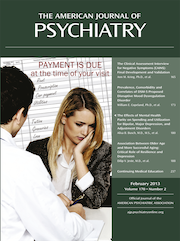Recalling Martin Luther King: Obama’s Effect on Memory
To the Editor: Memory distortion is a normal consequence of memory function (1) that has effects in psychiatry and in society. Early laboratory research found that pre-existing knowledge influences memory formation (2) and that learning new information can alter formed memories (3). Nonempirical studies have indicated that memory is also susceptible to distortion by sociocultural events or change (4, 5). I present here empirical observations indicating memory distortion related to the election of Barack Obama to President of the United States that have implications for understanding how social stereotypes and sociocultural change affect memory.
Motivated by observations made during court-ordered competency evaluations, a record review was performed on all evaluations completed by a regional office in 2008 and 2009 (N=198). Collected information included date of evaluation, competency opinion, demographic characteristics, measures of concentration and short-term memory, and the answer to the question “Who was Martin Luther King Jr.?” (N=92). Exemptions from further review were obtained from the Yale University and State of Connecticut institutional review boards before this research was conducted.
Before December 10, 2008, no person who was asked that question gave the answer “President” or anything similar. From that date onward, “President” became a common wrong answer (Figure 1), and its increase in frequency was statistically significant as a proportion of wrong answers given (0/13 before and 11/32 after; p=0.019) and as a proportion of all answers, either correct or incorrect (0/29 before and 11/63 after; p=0.032). No significant differences were observed among respondents in percent of correct answers or on measures of demographic characteristics, forensic finding (competent or not competent), short-term recall, or working memory.

a Shown as a percent of all incorrect responses from January 1, 2008, through December 31, 2009. The date of the election of Barack Obama is indicated with a dotted line.
Individuals who answered correctly at any time were more educated than those who answered incorrectly (mean=12.1 years of school [SD=2.4] and mean=10.6 years of school [SD=2.2], respectively; p=0.002), performed better on simple cognitive tests (e.g., digits forward; p=0.001), and did not differ in race (26% African American and 72% Caucasian compared with 27% African American and 67% Caucasian). Among those who answered incorrectly after December 10, 2008, no significant differences were observed on measures of demographic characteristics, forensic findings, or cognitive performance between those who answered “President” or gave a different incorrect answer. Representation of African Americans among those who answered “President” (45%), was numerically higher than among those who gave other incorrect answers (19%; p>0.1).
Despite limitations, these results suggest that the change in answers given after President Obama’s election reflects (postencoding) distortion. Such a finding implicates social stereotyping as relevant to memory distortion (6), with potential consequences for collective memory (7). For example, individuals who believe that Dr. King could have been President might be more likely to promulgate or accept views that overestimate the historical access to political power available to minorities in the United States. In this context, these results highlight the potential importance of more subtle but pervasive distortions of individual and collective memory that is caused by predominant stereotypes and allows status quo views of history to be promulgated with little question.
1 : Memory distortion: history and current status, in Memory Distortion: How Minds, Brains, and Society Reconstruct the Past. Edited by Schacter DL. Cambridge, Mass, Harvard University Press, 1995, pp 1–41Google Scholar
2 : Remembering. Cambridge, UK, Cambridge University Press, 1932Google Scholar
3 : Experimental contributions to the theory of memory. Z Psychol Z Angew Psychol 1900; 1:1–288Google Scholar
4 : The Mystic Chords of Memory: the Transformation of Tradition in American Culture. New York, Knopf, 1991Google Scholar
5 : Watergate in American Memory: How We Remember, Forget, and Reconstruct the Past. New York, Basic Books, 1992Google Scholar
6 : Implicit beliefs and memory: the bounded rationality of social judgments, in Memory, Brain, and Belief. Edited by Schacter DLScarry E. Cambridge, Mass, Harvard University Press, 2000, pp 139–175Google Scholar
7 : Towards a psychology of collective memory. Memory 2008; 16:183–200Crossref, Medline, Google Scholar



